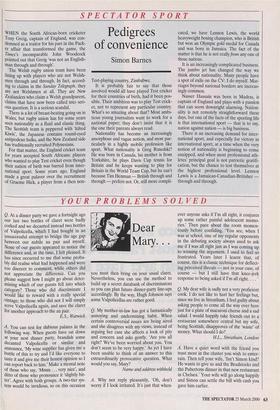YOUR PROBLEMS SOLVED
Dear Mary. . .
Q. At a dinner party we gave a fortnight ago our last two bottles of claret were badly corked and we decanted instead two bottles of Valpolicella, which I had bought in an unsuccessful attempt to bridge the age gap between our nubile au pair and myself. None of our guests appeared to notice the difference and, at the time, I felt pleased. It has since occurred to me that some proba- bly did realise what had happened and were too discreet to comment, while others did not appreciate the difference. Can you please suggest how I might go about deter- mining which of our guests fell into which category? Those who did discriminate I would like to reward with a really special vintage; to those who did not I will simply serve Valpolicella again, and save the claret for another approach to the au pair. E.S., Warwick A. You can test for dubious palates in the following way. When guests have sat down at your next dinner party, brandish some decanted Valpolicella or similar and announce, 'My wine supplier has given me a bottle of this to try and I'd like everyone to taste it and give me their honest opinion so I can report back to him.' Make a mental note of those who say, `Mmm ... very nice', and ditto of those who pronounce it 'slightly bit- ter'. Agree with both groups. A two-tier sys- tem would be invidious, so on this occasion you must then bring on your usual claret. Nevertheless, you can use the method to build up a secret databank of discriminators so you can plan future dinner-party line-ups accordingly. By the way, Hugh Johnson says some Valpolicellas are rather good.
Q. My mother-in-law has got a fantastically annoying and undermining habit. When certain controversial issues are being aired and she disagrees with my views, instead of arguing her case she affects a look of pity and concern and asks gently, 'Are you all right? We've been worried about you. You don't seem to be very happy.' As yet I have been unable to think of an answer to this extraordinarily provocative question. What would you say, Mary?
Name and address withheld A. Why not reply pleasantly, 'Oh, don't worry if I look irritated. It's just that when- ever anyone asks if I'm all right, it conjures up some rather painful adolescent memo- ries.' Then pace about the room momen- tously before confiding, 'You see, when I was at school, one of my regular opponents in the debating society always used to ask me if I was all right just as I was coming up to winning the argument. I used to feel so frustrated. Years later I learnt that, of course, this is a classic technique for deflect- ing perceived threats — not in your case, of course — but I still have that knee-jerk response to being asked if I'm all right. .
Q. My dear wife is sadly not a very proficient cook. I do not like to hurt her feelings but, since we live in Streatham, I feel guilty about asking people to come all the way over here just for a plate of macaroni cheese and a sad salad. I would happily take friends out to a restaurant somewhere central but my wife, being Scottish, disapproves of the 'waste' of money. What should I do?
H.L., Streatham, London A. Have a quiet word with the friend you trust most in the cluster you wish to enter- tain. Then tell your wife, 'Isn't Simon kind? He wants to give us and the Bradstocks and the Pubertons dinner in that new restaurant in Chelsea.' Your wife will go along happily and Simon can settle the bill with cash you gave him earlier.


































































 Previous page
Previous page